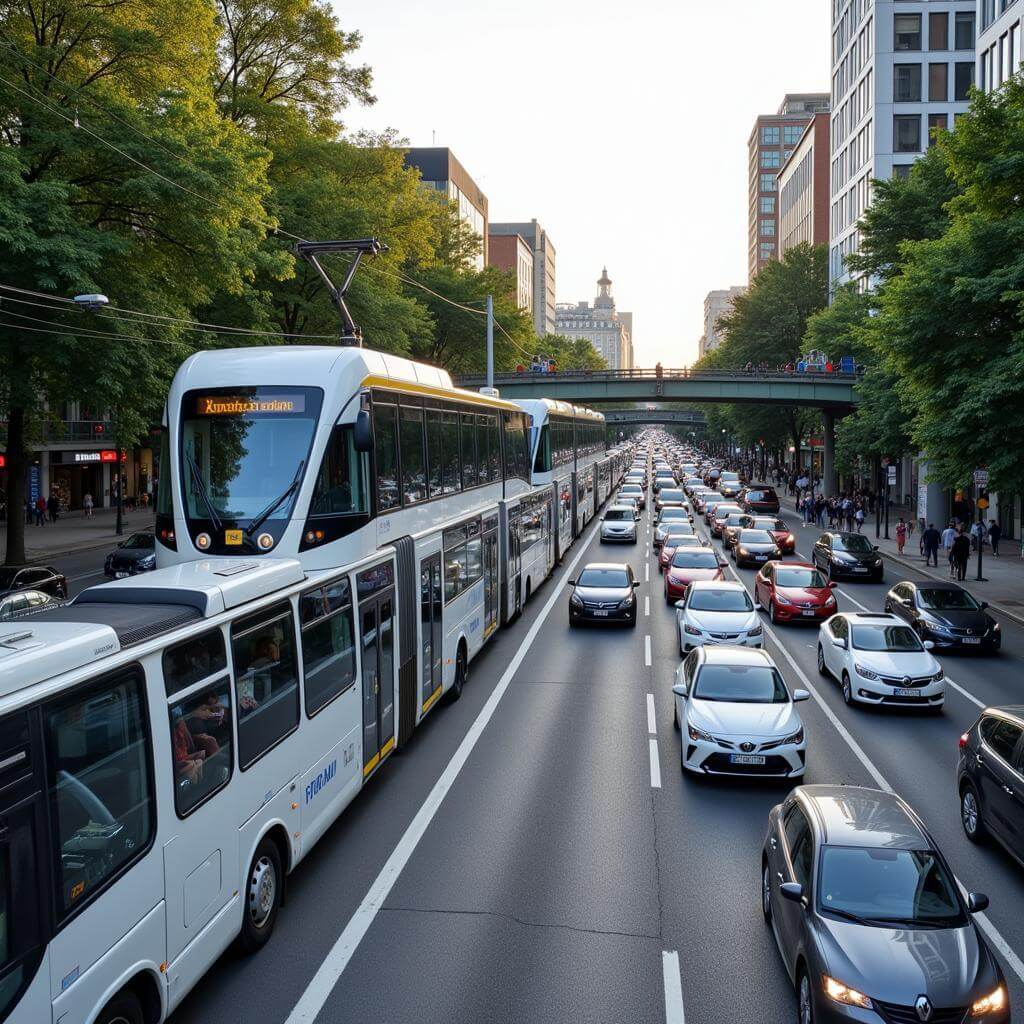Public transportation is a crucial topic in IELTS Writing Task 2, frequently appearing in exams and likely to remain relevant in future tests. Its significance stems from the global focus on sustainable urban development and environmental concerns. Based on past exam trends, we can expect questions related to public transport accessibility, its impact on pollution reduction, and its role in modern city planning. Let’s examine a sample question that encapsulates these themes:
Some people think that governments should invest in improving public transportation to reduce traffic congestion in cities. Others believe that building more roads is the best solution. Discuss both views and give your own opinion.
Analyzing the Question
This question presents a classic IELTS debate format, asking candidates to discuss two contrasting views on solving urban traffic congestion: improving public transportation versus building more roads. The task requires a balanced discussion of both perspectives and a clear personal stance.
Sample Essay 1 (Band 8-9)
Urban congestion is a pressing issue in many cities worldwide, and there are differing opinions on how to address it effectively. While some advocate for enhanced public transportation systems, others argue for road expansion. This essay will examine both viewpoints before presenting my own perspective.
Proponents of public transportation argue that investing in this area can significantly reduce traffic congestion. By providing efficient, affordable, and widespread public transit options, governments can encourage more people to leave their cars at home. This shift not only decreases the number of vehicles on the road but also contributes to reduced carbon emissions, aligning with global efforts to combat climate change. Moreover, well-planned public transport systems can accommodate more people in less space compared to private vehicles, making them an ideal solution for densely populated urban areas.
On the other hand, those in favor of road construction contend that expanding road networks is the most direct way to alleviate traffic congestion. They argue that more roads provide increased capacity for vehicles, reducing bottlenecks and improving traffic flow. Additionally, new roads can open up alternative routes, distributing traffic more evenly across the city. Supporters of this view often point to the immediate relief that road expansion can bring to overcrowded streets.
In my opinion, while both approaches have merit, investing in public transportation is the more sustainable and effective long-term solution. Improving public transit not only addresses congestion but also offers numerous ancillary benefits. It promotes social equity by providing affordable transportation options for all socioeconomic groups, reduces air pollution, and can stimulate economic growth by improving mobility and accessibility within cities. Furthermore, as cities continue to grow, the space-efficient nature of public transport becomes increasingly valuable.
In conclusion, while road expansion may offer short-term relief, the multifaceted benefits of enhanced public transportation make it the superior choice for tackling urban congestion. Governments should prioritize investments in comprehensive, efficient public transit systems to create more livable and sustainable cities for the future.
 Efficient public transportation reducing city traffic
Efficient public transportation reducing city traffic
Sample Essay 2 (Band 6-7)
Traffic congestion is a big problem in many cities today. Some people think the government should spend money on better public transport, while others say building more roads is better. I will discuss both ideas and give my opinion.
Improving public transportation can help reduce traffic. When buses and trains are good, more people will use them instead of driving cars. This means fewer cars on the roads and less traffic. Public transport is also better for the environment because it causes less pollution than lots of cars. In many big cities, like New York or Tokyo, good public transport helps many people move around easily.
However, some people think making more roads is the answer. They say new roads give cars more space, so traffic can move faster. New roads can also give drivers different ways to get to places, which might make some roads less busy. In some places, building new roads has helped reduce traffic jams.
I think improving public transportation is better than making new roads. While new roads might help for a short time, they often get full of cars again quickly. Good public transport can move more people using less space. It’s also cheaper for people to use and better for the environment. Cities with less pollution from cars are healthier places to live.
In conclusion, I believe that spending money on better public transport is the best way to solve traffic problems in cities. It helps more people, is good for the environment, and can work well for a long time.
Sample Essay 3 (Band 5-6)
Traffic in cities is a big problem. Some people think the government should make public transport better. Other people think building more roads is better. I will talk about both ideas.
Making public transport better is a good idea. If buses and trains are good, many people will use them. This means less cars on the road. Less cars means less traffic. Public transport is also good for the environment. It makes less pollution than many cars.
But some people think more roads are better. They say more roads give more space for cars. This can make traffic move faster. New roads can also give drivers new ways to go places. This might make some roads less busy.
I think making public transport better is the best idea. It can help more people move around the city. It is also cheaper for people to use. Public transport should be easy for everyone to use. More roads might help for a short time, but they will get full of cars again.
In conclusion, I think the government should spend money on better public transport. It is good for people and the environment. It can help solve traffic problems for a long time.
Explaining the Band Scores
Band 8-9 Essay:
- Task Achievement: Fully addresses all parts of the task with a well-developed response.
- Coherence and Cohesion: Ideas are logically organized with clear progression throughout.
- Lexical Resource: Wide range of vocabulary used with flexibility and precision.
- Grammatical Range and Accuracy: Wide range of structures used accurately and appropriately.
Band 6-7 Essay:
- Task Achievement: Addresses all parts of the task, though some aspects are more fully covered than others.
- Coherence and Cohesion: Information and ideas are generally well organized with some use of cohesive devices.
- Lexical Resource: Sufficient range of vocabulary for the task, with some attempt at less common words.
- Grammatical Range and Accuracy: Mix of simple and complex sentence forms with generally good control.
Band 5-6 Essay:
- Task Achievement: Addresses the task only partially, with limited development of ideas.
- Coherence and Cohesion: Basic organization of information and ideas, but not always clear.
- Lexical Resource: Limited range of vocabulary, adequate for basic communication.
- Grammatical Range and Accuracy: Limited range of structures with some errors that may impede communication.
Key Vocabulary to Remember
- Urban congestion (noun) – /ˈɜːrbən kənˈdʒestʃən/ – overcrowding of vehicles in city areas
- Public transit (noun) – /ˈpʌblɪk ˈtræn.zɪt/ – transportation systems available for public use
- Sustainable (adjective) – /səˈsteɪ.nə.bəl/ – able to continue over time without damaging the environment
- Infrastructure (noun) – /ˈɪn.frəˌstrʌk.tʃər/ – basic physical systems of a country or city
- Alleviate (verb) – /əˈliː.vi.eɪt/ – to make a problem or suffering less severe
- Ancillary (adjective) – /ˈæn.sə.ler.i/ – providing necessary support to the main part
- Socioeconomic (adjective) – /ˌsoʊ.si.oʊ.ek.əˈnɑː.mɪk/ – related to social and economic factors
- Mobility (noun) – /moʊˈbɪl.ə.ti/ – the ability to move freely and easily
- Livable (adjective) – /ˈlɪv.ə.bəl/ – suitable for living in
- Comprehensive (adjective) – /ˌkɑːm.prəˈhen.sɪv/ – including everything that is necessary
In conclusion, the importance of public transportation in cities remains a critical topic for IELTS Writing Task 2. Future exams may explore related themes such as the impact of electric vehicles on public infrastructure or the benefits of car-free zones in urban areas. To prepare effectively, practice writing essays on these topics, considering various perspectives and using relevant vocabulary. We encourage you to write your own essay on the sample question provided and share it in the comments section for constructive feedback and further improvement.


